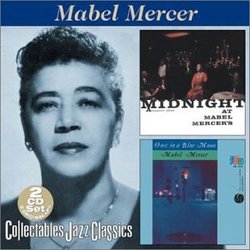| All Artists: Mabel Mercer Title: Midnight at Mabel Mercer's/Once in a Blue Moon Members Wishing: 0 Total Copies: 0 Label: Collectables Records Release Date: 9/26/2000 Genres: Jazz, Pop, Broadway & Vocalists Styles: Vocal Jazz, Vocal Pop, Cabaret Number of Discs: 2 SwapaCD Credits: 2 UPC: 090431660324 |
Search - Mabel Mercer :: Midnight at Mabel Mercer's/Once in a Blue Moon
 | Mabel Mercer Midnight at Mabel Mercer's/Once in a Blue Moon Genres: Jazz, Pop, Broadway & Vocalists
|
Larger Image |
CD DetailsSimilarly Requested CDs
|
CD ReviewsMabel Mercer: Simply the Best Santo Giglio | BROCKPORT, NY | 10/18/2000 (5 out of 5 stars) "I am extremely pleased to see that some of Mabel Mercer's finest work on vinyl is finally being reissued on compact disc. Her recording of "Isn't It A Pity" included in this set makes a great song even greater for no one was able to interpret a lyric like the incomparable Mabel Mercer. Her singing of "Once in A Blue Moon" accompanied by an extraordinarily beautiful arrangement is worth the price alone and I cannot recommend highly enough this collection for any true Mercer fan. "I'm Glad I'm Not Young Anymore", "Blame It On My Youth" and Noel Coward's "Sail Away" are particular standouts among the gems included here. A great big thank you to the producer of this superlative set--an absolute must buy! A true artist sadly missed!" Two discs of Mercer magic BDormuth | 07/20/2001 (5 out of 5 stars) "There's an abundance of Mercer riches to be savored on this generous two disc set. "Once in a Blue Moon," on which Mercer is accompanied by piano and a small string section, is a sentimental favorite of many, and for good reason: Mercer has rarely been more affecting than in the title track and her famous version of "My Shining Hour," and the string arrangements are admirably restrained, accentuating Mercer's message rather than imposing false sentiment on top of her interpretations. But it's "Midnight at Mabel Mercer's" that is the real gem here: it offers an opportunity to hear Mercer much as she must have sounded in her legendary New York appearances in the 40's and 50's, accompanied only by piano (two in this recording) and singing uninhibitedly full-out, going for the climaxes of the songs whether the notes are in her voice or not (and quite often they aren't). A word must be said about "the voice" to those unfamiliar with Mercer--there isn't, by the fifties, when these recordings were made, much of it left, though it sounds as though it must have been a perfectly good mezzo in its prime. Just the same it's hard to think of a more eloquent singer of popular song. As skilled at tossing off a frothy number like "Wouldn't it be Loverly" with just the right light touch as she is in revealing all the genuine sadness and regret in potentially maudlin ballads like "Poor Pierrot" or "Young and Foolish," Mercer has that ability to communicate that no amount of stunning vocal chops can compensate for. Sure, there's a lot of creakiness here and there, flubbed top notes and odd rolled r's, but give her a chance and you'll find the tattered velvet of Mercer's voice enormously appealing." Simply Elegant BDormuth | Lafayette Hill, Pa United States | 04/16/2002 (5 out of 5 stars) "It is impossible to describe Mabel Mercer. She is as unique as Blossom Dearie, Tammy Grimes, Elaine Stritch, Bea Lilly, or Edith Piaf, but not nearly as unusual as any of them. Fred Astaire's style might be closest to hers, although Mercer had a better voice with a greater range. Both were songwriter's singers - interpreters who put the song before the personality, who presented the work paying complete attention to the nuances of the music and the exposition of the lyrics. The song spoke for itself. Among current mainstream performers, perhaps most reminiscent of Mabel Mercer is Rosemary Clooney, although Clooney's direction - and she is superb - is not to distill the songs to quite so pure an essence as did Astaire and Mercer.If elegance is restraint of ornament allied with purity of form and richness of substance, then Mabel Mercer is simply elegant.Among this rich substance there are some evergreens like "I'm Glad I'm Not Young Anymore," '"Loverly," "Young and Foolish," and, perhaps, "Blame It On My Youth". But most of these songs were obscure even when the albums were recorded in 1956 and 1958, and the passing of more than 40 years has not shed any more light on them. Some are minor works of major composers and lyricists: Romberg, Hammerstein, Kern, Rodgers, Hart, Lerner, Lowe, Coward, the Gershwins, Arlen, Mercer, Bernstein, Comden and Green. Others are works of a group of less known talent: Howard, Wilder, Levant, Coleman, and Grant. But all tell simple stories or present poignant images, and after a night at the theater Mercer's 11:30 PM audience was ready for gentle songs of quiet reflection made, perhaps, even more evocative by their very unfamiliarity.Almost all of the songs are about love at some stage: anticipation ("Wait Til You See Her"), yearning ("Lonely Little Boy"), despair ("Blue Moon," "If Love Were All'), fulfillment ("Some Other Time"), loss ("He Was Too Good To Me," "Guess I'll Go Back Home"), lost youth ("Isn't It a Pity," "Young and Foolish"), and gained wisdom ("Once Around the Clock," "Sail Away").Most of the lyrics are of the Seine/champagne variety, although of course there is Noel Coward with this rhyming full-house ("though I never really grumble life's a jumble indeed, and in my efforts to succeed I've had to formulate a creed"), and Ira Gershwin shows his usual virtuosity in "Isn't it a Pity":
Think of all the lonely nights we've wasted: I with the neighbors, you at silly labors, What joys untasted: I reading Heine, you somewhere in China . . . Think of all the lonely years we've wasted: fishing for salmon, loosing at backgammon, What joys untasted: my nights were sour spent with SchopenhauerMercer adds only the most subtle trace of distaste to the word "Schopenhauer." In "Guess I'll go Back Home" she adds just the slightest emphasis to the first "he": "I'll walk by the house where he used to live, I hope he married well." It's the verbal equivalent of a slightly raised eyebrow or an up-turned palm.On "Midnight at Mabel Mercer's" the accompaniment is provided by two pianos. The pianos are particularly well arranged on "Sonnet," " Wait Til you See Her," and especially "Young and Foolish." On "Once in a Blue Moon" strings are added. Even at this point in her career, Mercer had the ability to overpower the accompaniment. She chose not to, and the strings are distracting." |

 Track Listings (16) - Disc #1
Track Listings (16) - Disc #1


